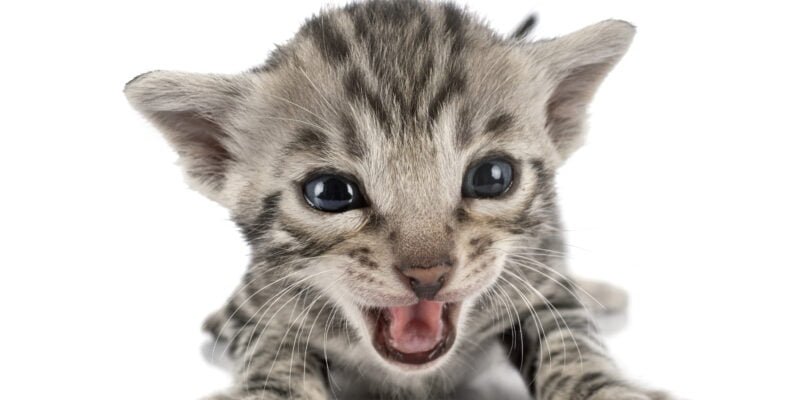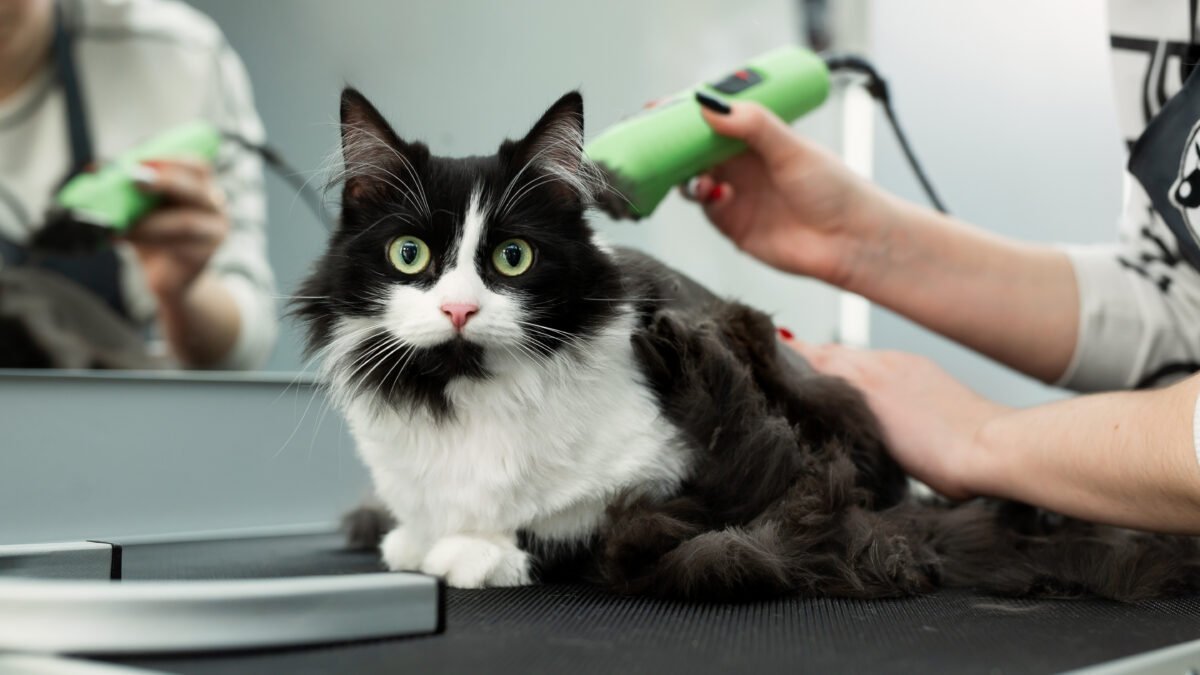
Last Updated on
January 18th, 2023 07:50 pm
Cats make a variety of sounds, but why do they do it? The answer to this question lies in the way they were domesticated. Cats originally came from Asia where they were tamed by humans as early as 8,000 years ago. Perhaps because of their association with humans, cats have been able to develop a variety of sounds for a variety of situations.
Cats meow for a variety of reasons, but it’s largely because they have the instinct to vocalize to communicate. Cats are domesticated and naturally love contact with humans and other cats. They develop their noises to communicate with others, especially when they become comfortable around people and seek contact with them.
So let’s take a closer look at the reasons why cats meow and how we can apply that knowledge to becoming the best cat parents we can be!
Why Do Cats Meow?
Cats typically meow when they are communicating with other cats or with people. They meow to communicate with other cats, alerting them that there is another cat in the vicinity or inquiring about the health of an individual cat. They also meow when communicating with people, usually when soliciting attention from their owners or expressing an intense emotion such as anger or frustration.
Kittens and young adult cats may also meow to communicate with other kittens, vocally advertising their presence and greeting potential playmates. These noises are not cries, but rather vocalizations that adults often possess as well; however, kittens are more likely than adults to vocalize frequently during infancy due to the increased activity and desire for social interaction that accompanies this stage of development.
The Importance of Vocalizing for Cats
Cats rely on their voices to communicate with other cats and people. The vocalization of cats is important for many different reasons. Cats vocalize when they are communicating with other cats to make themselves known. But they can also can vocalize as a way of asking for attention from humans or expressing emotions such as frustration, especially when it’s time for dinner!
Cats meow to communicate with other cats and signal that there is another cat in the area. They also meow to solicit attention from their owners or express an intense emotion like frustration.

Why Do Cats Meow When They Are Happy?
Cats may meow when they are happy as a way to communicate with other cats or with people. Cats typically meow when they are communicating with other cats, alerting them that there is another cat in the vicinity or inquiring about the health of an individual cat. Cats also meow to communicate with people, usually when soliciting attention from their owners or expressing an intense emotion such as anger or frustration.
When cats are playing and having fun, they will sometimes make short and high-pitched calls, similar to a kitten’s cry. These vocalizations don’t involve any jaw movement but do sound similar to a kitten’s cry. This type of vocalization is often seen during play fights between cats. Kittens and young adult cats may also emit these sounds while playing with each other, vocally advertising their presence and greeting potential playmates.
These noises are not cries, but rather vocalizations that adults often possess as well; however, kittens are more likely than adults to vocalize frequently during infancy due to the increased activity and desire for social interaction that accompanies this stage of development.
Why Does a Cat Meow When It’s Scared?
If you’re walking through your house and a cat is giving off a high-pitched meow, you might assume that it’s mostly due to stress or if it’s a new cat in the house. But what if the cat engages in loud meowing at night? This may suggest that the noise is actually a cry for help in cat language. When cats are scared, they instinctively meow.
And this instinctive response can be helpful. Studies show that cats’ cries can often alert people to an emergency situation–such as an animal attack–as well as reassure a frightened cat who has been playing with its human companions and wants them back in bed.
Cats also vocalize when they are sick, hungry, or feeling threatened. Sometimes their cries sound like those of humans; other times they are more like the yowls of small kittens or the rumbling growls of adult cats. These sounds serve different purposes for each type of animal depending on their size, health, and temperament (for instance, a small kitten would produce more high-pitched squeaks than an older girl).
Why Do Cats Meow When They’re Angry or Frustrated?
Cats are known for their curt, efficient meows when they’re frustrated or angry with humans. This is because the sounds are low-pitched and not as loud as a cry. One word that describes these vocalizations is hiss. In addition to being used to communicate with other cats, this sound may also be used to threaten other animals or humans.
This noise is also often made when cats are playing or fighting with other animals. Cats also make this noise when they’re trying to get attention from their owners, which can result in getting in trouble for making too much noise or interrupting what’s going on around them. Knowing the body language of your feline friend is essential to build a healthy relationship and reduce the stress imposed on the cat.
Can You Train a Cat to Stop Meowing?
Some people have taken to training cats not to meow due to excessive meowing. This is actually a difficult task, however, as the types of sounds that cats make are largely innate. Cats meow for many reasons, so it’s difficult to control this behavior with any sort of training that lasts long periods of time.
There may be some cases where ignoring the cat while they meow will cause them to stop vocalizing altogether. However, before you try this tactic, you should consider whether or not your cat might be in true distress and need your help. Excessive meowing is often a sign that something’s wrong, whether it’s cognitive dysfunction from the cat’s age or another underlying condition or stressor in the cat’s life.
If you’re really concerned, consider speaking to a veterinarian or a cat behaviorist. A cat behaviorist in particular can offer more specific advice to your unique situation if your cat is otherwise healthy.
Let Cats Meow – They’re Cats!
In conclusion, cats meow for a variety of reasons. They may meow to communicate with other cats or people, to express an emotion such as anger or frustration, or simply to get attention from their owners.
It is possible to train your furry friend not to meow in certain situations (a cat behavior consultant can help with that). But it is important to remember that cats are naturally vocal creatures and that their meows can often be indicative of a need for help.













